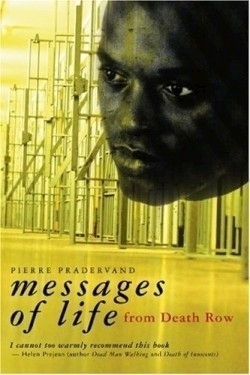Messages of Life
Inmates of Texas’s Death Row live in 10 x 6.5 foot cells. In winter the temperatures plummet and officials delay turning on the heat so that the prisoners shiver in their cells. In summer it can get up to 120 degrees, yet air conditioners are left off for weeks. As the convicts await execution, every second of their day is controlled, from the food (usually cold and often inedible), to the number of stamps an inmate can buy, what they own, what they wear, who can visit, how much toilet paper they have, and shower temperatures (often frigid or scalding). But while the authorities control many critical elements of life, they cannot control what a person thinks or feels. And Roger McGowen has found a way to transcend.
McGowen, a death row inmate, has been corresponding with Pierre Pradervand since 1997. Excerpts of his letters make up half of this book. He describes his spiritual journey as he confronts the deprivation, inhumane conditions, sadistic guards, and the arbitrary cruelties that abound on death row. But, instead of bitterness, he has chosen love as his guiding principle. “This place can make the most religious person hang his head in wonder, but it is also a place of higher learning,” he writes. “It teaches you patience, it teaches you humility, it teaches you love, it teaches you sorrow, heartache, and pain.Â…in the end love is what really matters, everything else dulls in comparison.”
In March 1986, an armed man in a ski-mask walked into a lesbian bar, Just Marion and Lynn’s. The owner, Marion Pantzer, a well-known gay community leader who opened one of Houston’s first lesbian bars, pulled her gun and the two exchanged fire. Pantzer died and McGowen, who proclaims his innocence, was convicted of killing her. The trial had many problems, including a drowsy defense lawyer who interviewed no witnesses, jurors who read articles about the trial during the deliberations, a retired cop who, as foreman of the jury, influenced the jurors to impose the death penalty, and directions from the judge seemingly designed to sway jurors toward the death penalty. However, a signed confession and testimony from a cousin (one of the men who committed the crime then became a cooperating witness) convinced the jury.
Pradervand, a Swiss national, is the author of The Gentle Art of Blessing, Listening to Africa, and other books including a French version of Messages. Organized with McGowen’s letters on the right-hand pages and articles about the U.S. justice system and Pradervand’s thoughts on the left-hand pages, the book is a powerful argument against capital punishment and a moving testament of perseverance and spiritual growth. Unfortunately, it suffers from layout shortcomings that force readers to backtrack and many typos including, unfortunately, Pantzer’s name. However, because of McGowen’s emotional and spiritual maturity, people who pick up this book have the opportunity to learn from an inspiring teacher.
Disclosure: This article is not an endorsement, but a review. The publisher of this book provided free copies of the book and paid a small fee to have their book reviewed by a professional reviewer. Foreword Reviews and Clarion Reviews make no guarantee that the publisher will receive a positive review. Foreword Magazine, Inc. is disclosing this in accordance with the Federal Trade Commission’s 16 CFR, Part 255.

